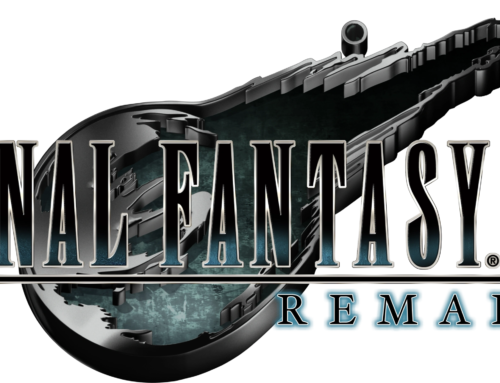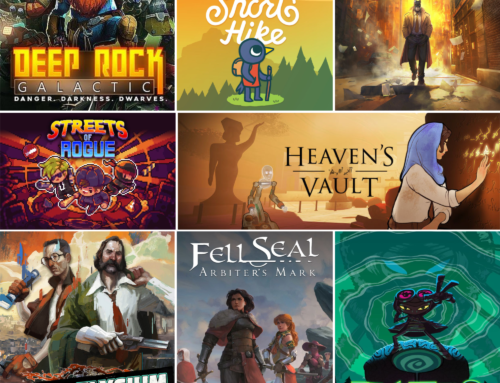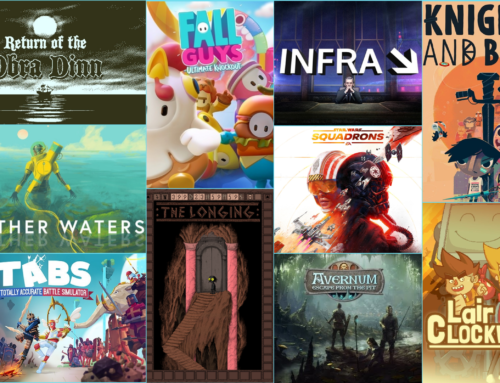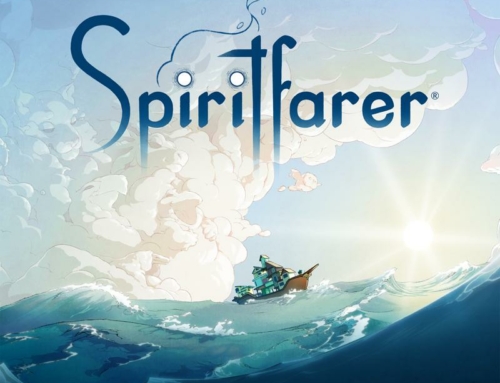A Monthly Open Letter Series
Welcome to Game Club, where once a month I discuss a game with the esteemed Joanna Tova Price. This week, we’re talking about Quadrilateral Cowboy by Brendon Chung (AKA Blendo Games). This is the second letter in a three-letter series. You can find Part One here, and Part Three here. All posts contains spoilers for the entire game.
Hey Joanna,
As you know, I’m an enormous fan of Blendo Games’ entire portfolio, so it should come as no surprise that I also loved Quadrilateral Cowboy. I’d like to dig into this game a bit before I address your specific reactions.
One of the things I most enjoy about Brendon Chung’s games is that they are consistently genre-defying. His early independent works experimented with first-person storytelling in game engines developed for more-or-less straightforward shooting. He explored replacing the lone action hero with a proper squadron in Bootleg Squadrog and spun surreal, humorous meta-narratives in the Barista series. Gravity Bone, the first game to employ the cubist visual style used in Quadrilateral Cowboy, is one of the unsung progenitors[1] of first-person storygames.[2] Flotilla combines the 15-minute roguelike space adventuring of Strange Adventures in Infinite Space with a turn-based, 6DOF tactical shooter. Atom Zombie Smasher is a story-driven tower defense game in which consistently winning is almost impossible. Air Forte is an educational shoot-em-up. We can see traditional genre templates in each of these, but they go in unexpected directions.
Quadrilateral Cowboy is the same. You compared it to Portal and The Witness, which I think is fair; there’s a fairly small genre of first-person puzzlers (largely popularized by, yes, Portal). What they all share in common – other than their perspective – is that they all feature puzzles of environmental manipulation, of using a very limited number of tools and objects to carve a path through the world. Quadrilateral Cowboy does this, of course; the difference is that all of the objects, and the world itself, is controlled and manipulated through the command line of a alternate-1980s laptop. Likewise, there’s a range of puzzle games that are built on programmatic logic (e.g. SpaceChem, Human Resource Machine) but these inevitably attempt to make the puzzling more accessible by representing the programming visually rather than in a traditional terminal environment.
At this point it’s worth noting that I have effectively zero coding experience, and so our experiences with the puzzles were probably pretty different. I found them a real challenge, since this was largely new territory to me (though I at least understood some basic coding concepts through a combination of my years as a technical writer and aforementioned programming games). I *feel* like my success at this game suggests that most dedicated players with no coding experience could beat the game (if not set any records) and that speaks to the quality of the game’s instruction.
The best puzzle games present you with challenges that seem impossible, and yet give you the tools, head space, and silent direction needed to overcome them; you end up convinced that you’re a genius, and it feels wonderful. The greatest accomplishment of Portal is that it managed to do this on a mass scale, creating seemingly devious puzzles that nevertheless could be overcome by almost anyone. In order to do this, however, it had to create a fairly limited environment; the player cannot really screw themselves and is never overwhelmed with choices, so will inevitably find the answer through patience and experimentation if nothing else.
Quadrilateral Cowboy’s environments are bigger and the player is given considerably more tools to modify it; by the final level, you have about 9 different tools to employ, not even counting the array of programming tricks you can leverage (the terminal, while stripped down to be accessible to newbies, is nevertheless very powerful and allows for all sorts of complex scripts). One of the most interesting design decisions seen in Quadrilateral Cowboy is to have all of the puzzles take place inside a simulation (within the game) which allows for diagetic redos, noclip modes, movable spawn points, etc. This is in many ways a necessary accommodation for its complexity; players who want to see the narrative through need extra tools and options. Along similar lines, while the missions are theoretically timed, in most cases this is just a matter of getting a high score; as long as you get in and out without dying, you pass the mission. The game even lets you skip missions you find too difficult.
I find this design so interesting because the game does occupy this unusual middle ground. It is, as you say, overtly non-casual; the simple fact that you have to do basic programming, and that tutorials more take the form of helpful scribbled notes than any overt hand-holding, means that a lot of people will bounce right off. You have to put in real work to beat this game, to the point that I couldn’t play it when I needed to veg after work. But at the same time, it gives the player so many tools, and is so forgiving of failure, that it demands diligence more than it does brilliance (contrast this with SpaceChem, which is a series of increasingly difficult puzzles that will end up overwhelming anyone but the most seasoned puzzlers). In this sense its difficulty curve resembles an RPG more than it does a traditional puzzle game, and I can only assume that at the end of the day this is a result of a LOT of user testing.
Anyway, to actually address your main point: it is a very lonely game, albeit a loneliness that (like you) I find more comfy than disarming. I suspect that the places you infiltrate are bereft of live as a matter of scope more than anything else; NPC agents would not only force Chung to write AI and design systems for interacting with the NPCs, it would also shift the focus of the game. Either the player would be able to defeat the guards (at which point it would become as much a combat game as a puzzle one) or they’d have to avoid them, which would make it a stealth game and also create additional time pressure for the player (not only would they be running against the clock, but they’d have to perform tasks before they were spotted by a guard). From a narrative standpoint, we can almost wonder if the actual places *are* bereft of guards; keep in mind that we, as the player, only plan the heist in our simulation, rather than conducting it ourselves (an activity that presumably happens off-screen, though the game is ambiguous about this).
And yet the lonely feel of the levels is contrasted by the narrative interludes, which focus on three friends (who met at an adult school, from what I gather) and the company they make. It definitely walks a fine line between heartwarming and depressing; heartwarming because they stick together through thick and thin and are pursuing their dreams, but depressing because they literally parts of themselves for their work (as the game progresses, they replace more and more of their original body parts with cybernetics; it’s left to the player to decide if this is discomforting or not, but it certainly was for me). Eventually, the player character – who appears to be married or at least sexually involved with someone – replaces their entire body. Which to my mind is sort of inherently lonely in and of itself. The story also stands out by virtue of having all of the main characters be woman, and yet not offering any overt commentary on this; it’s like this game is from an alternate reality in which this isn’t a big deal, and it doesn’t feel the need to flaunt its feminist credentials. Off the top of my head, I can’t think of any other game I can say that for.
In terms of the overall storytelling, Chung has said in the past (including in an interview I did with him in 2012) that he has a strong aversion to exposition, and so his games tend to be more evocative than specific; I love the style, and the fact that he goes for humor as much as pathos helps ward off any accusations of “pretentiousness.” In that spirit it may not be worth trying to answer too many questions about the specifics working of the lives of Quadrilateral Cowboy’s characters; we are not given the answers, and thus they are left up to our imagination.
As far as the social and modding features: it does seem absolutely clear that Chung is trying to give this a game a life beyond his own development. The social features are kind of necessary to the design; there needs to be some incentive or reward for really clever, programmatically complex heists that go beyond the bare minimum required for victory, and seeing record holders is a big part of that. Most games would use a global leaderboard for this; I was surprised by how much this focused on what my friends accomplished. I imagine most Steam users don’t have many, or any, friends with this game (given its niche focus) so I’m curious how that would play there.
I have a bunch of video footage of my playthrough recorded (for an unrelated project), and there’s a really nice bit with the sticky notes in there; I’ll try to share it in the next blog. I certainly have more to say, but at 1600 words I think this is more than enough for now, and look forward to hearing you further thoughts.
P.S. I’m going to extract some nice screenshots in the video editing process and will eventually update this letter with them; but I’m a bit swamped right now and that probably won’t be able to happen for a few weeks, so for now you (and any readers we might have) get a wall of text. Sorry!
- [1]Dear Esther tends to get all the credit here, and while its influence is significant, a lot of that is simply a result of it getting a commercial release; for whatever reason, the gaming press, and gamers at larger, tend to ignore freely released single player games. When they both came out in 2008, Dear Esther and Gravity Bone got similar coverage and reached an audience of roughly the same size, as far as I can tell. ↩
- [2] I really dislike ‘walking simulator,’ an intentionally inaccurate description originally created as a sort of genre slur, so I’m going with “first-person storygames” until I get something better. ↩





[…] Be sure to see Dylan’s reply here. […]
[…] is a response to Dylan’s reply to my first post about Quadrilateral […]